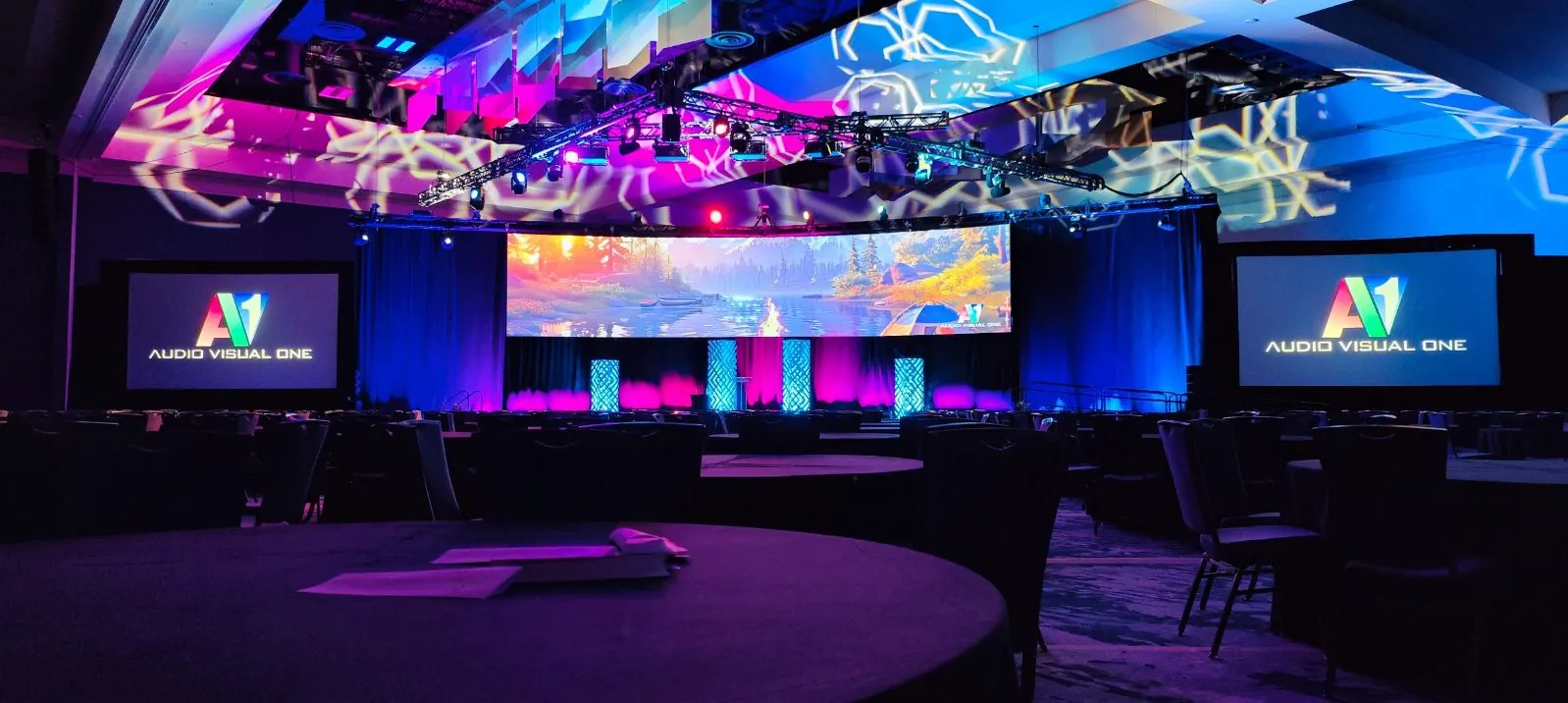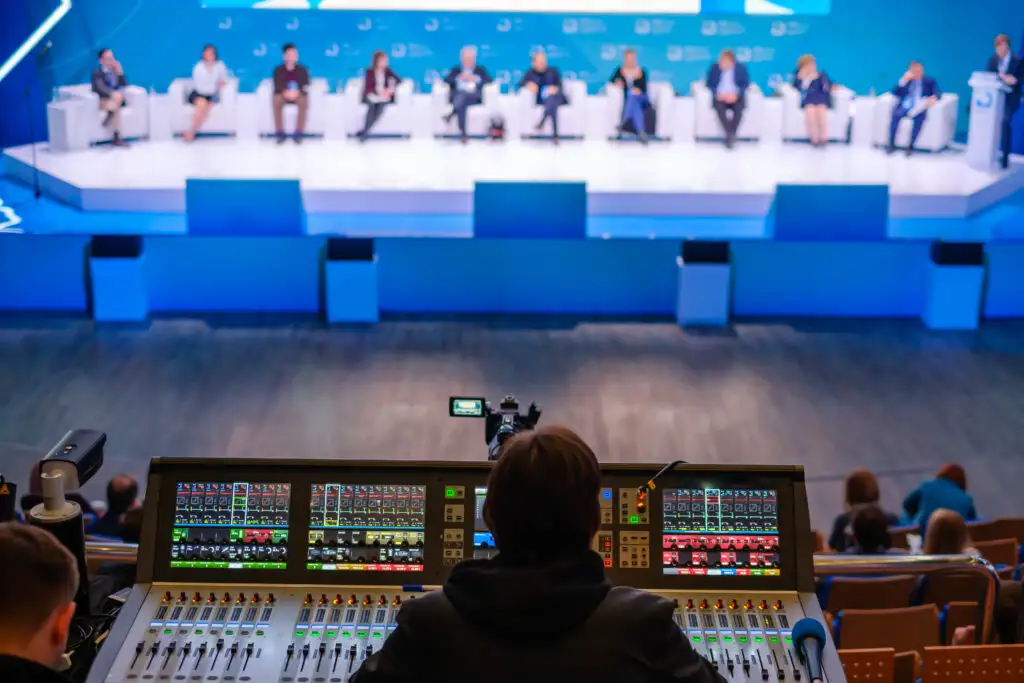Discover Exceptional Audio Visual Services for Your Upcoming Event
Discover Exceptional Audio Visual Services for Your Upcoming Event
Blog Article
Comprehending the Principles of Event Production
The intricacies of occasion manufacturing require a thorough understanding of a number of fundamental aspects, including the facility of clear goals, careful budgeting, and tactical location selection. Each component plays a pivotal function in the seamless implementation of an occasion, influencing every little thing from target market engagement to logistical efficiency. The technological facets of production and the characteristics of team sychronisation are equally vital to achieving a cohesive end result. As we explore these critical factors, one have to consider just how they interrelate and influence the overall success of an occasion. What strategies can be used to harmonize these aspects effectively?
Defining Event Goals
Specifying occasion purposes is an important action in the occasion manufacturing process, acting as the foundation upon which all preparation and execution are constructed. Clear objectives give direction, guaranteeing that all stakeholders comprehend the occasion's objective and wanted outcomes. These goals should specify, quantifiable, attainable, appropriate, and time-bound (CLEVER), which allows for efficient analysis of success post-event.
Recognizing the target market is crucial fit the objectives. Recognizing their expectations, demographics, and rate of interests enables occasion organizers to customize content and experiences that reverberate with attendees. In addition, straightening the goals with more comprehensive organizational goals promotes support from management and stakeholders, making sure that the event adds to the overall goal.
It is essential to interact these goals clearly to all team participants involved in the preparation process. By developing distinct goals, event manufacturers can produce a structured framework that overviews decision-making and resource allocation, eventually leading to a successful event.
Budgeting for Success
Efficient budgeting is essential for the effective manufacturing of any kind of occasion, as it gives a financial framework that supports all preparing activities. A well-structured budget permits event organizers to allot resources successfully, guaranteeing that every aspect of the occasion is properly funded while decreasing the risk of overspending.
To create an efficient budget, start by determining all prospective costs, such as location expenses, event catering, home entertainment, tools rentals, and advertising. It is crucial to classify these expenses right into dealt with and variable prices, which helps in understanding which elements are non-negotiable and which can be adjusted based on financial constraints.
In addition, earnings sources ought to be identified early in the budgeting procedure. This consists of ticket sales, sponsorships, and merchandise sales. By approximating possible revenue, planners can straighten their expenses accordingly, making sure that the event stays monetarily feasible.
Regular surveillance of the budget plan throughout the planning process is vital. This permits changes to be made as necessary, keeping monetary discipline. Ultimately, an effective spending plan not only safeguards against unforeseen prices but also improves the general high quality and experience of the occasion, ensuring its success.
Venue Selection Techniques
Picking the appropriate location is a critical element of successful event manufacturing, as it sets the phase for the total experience. The very first step in location option is to define the event's goals and target market, which will certainly assist the choice of area and capacity. Factors to consider such as access, atmosphere, and offered services should align with the occasion's motif and function.
Next, assess the place's capability to suit your anticipated number of guests while ensuring convenience and engagement. It is important to visit potential locations in person to assess their format, facilities, and total charm. click here for info In addition, examine logistical aspects consisting of parking availability, public transport gain access to, and any constraints that may impact the occasion.
Budget plan restraints are likewise vital; ensure that the place fits within financial parameters while providing needed services. Contract arrangements ought to be approached with diligence, looking for openness relating to added prices, cancellation policies, and responsibility insurance coverage.
Lastly, think about the venue's credibility and previous efficiency for similar events (Audio Visual Services). Engaging with previous clients can offer beneficial understandings into the place's dependability and service high quality, inevitably assisting in making a notified decision

Technical Production Components
Technical production components act as the foundation of any type of event, ensuring that all audio, aesthetic, and lighting parts function harmoniously to produce an immersive experience. These elements include a variety of modern technologies and techniques intended at supplying material efficiently and engagingly.
Audio systems are essential, involving microphones, speakers, and mixing tools to ensure clear sound distribution. High-grade audio is necessary for preserving target market engagement, specifically in bigger venues. Aesthetic parts consist of estimate systems, LED displays, and video clip feeds, which improve the aesthetic story of the occasion and sustain the general theme.
Lights plays a critical role in leading and establishing the state of mind audience emphasis. A well-designed lighting plan includes various methods, such as spotlights, ambient lights, check my reference and color cleans, to develop dynamic ambiences proper for various segments of the event.
In addition, technical production components need precise planning and assimilation. This includes pre-event noise checks, video clip wedding rehearsals, and lights examinations to deal with possible obstacles before the occasion starts. Inevitably, a natural technical production approach not just boosts the event experience but likewise shows the professionalism and interest to information that individuals anticipate.

Group Control and Duties
Effective occasion production depends upon seamless group control and clearly defined roles amongst all participants. For an event to run smoothly, each team participant should understand their responsibilities and exactly how they add to the overall vision. This begins with developing a detailed organizational framework that defines duties such as occasion manager, logistics coordinator, technical supervisor, and advertising expert. Each function lugs particular duties that have to be implemented in combination with each other.
Efficient interaction is vital in this joint environment. Audio Visual Services. Normal conferences and updates ensure all group participants are aligned and can adapt to any changes or difficulties that arise. Utilizing job management tools can facilitate this interaction, permitting for real-time updates and this page task tracking
In addition, cultivating a culture of teamwork is crucial. Motivating collaboration amongst varied capability not just boosts analytical but also advertises a favorable functioning atmosphere. When staff member feel valued and equipped, their performance boosts, ultimately bring about a more successful occasion.
Conclusion
To conclude, a comprehensive understanding of event manufacturing incorporates defining clear purposes, establishing a robust budget plan, picking an ideal venue, handling technological production aspects, and making certain efficient group control. Each component plays an important role in the overall success of an occasion. By meticulously addressing these basics, occasion coordinators can enhance the attendee experience, optimize sources, and achieve desired end results, therefore adding to the occasion's general effectiveness and influence within the designated target market.
The intricacies of event manufacturing need a detailed understanding of numerous foundational elements, including the establishment of clear objectives, thorough budgeting, and critical place option.Defining event goals is a critical step in the event manufacturing procedure, serving as the structure upon which all planning and implementation are developed. By establishing well-defined purposes, occasion producers can develop an organized structure that guides decision-making and source allocation, inevitably leading to a successful occasion.
In conclusion, a thorough understanding of event manufacturing includes specifying clear objectives, developing a durable budget plan, picking an appropriate location, managing technical manufacturing elements, and making sure reliable group coordination. By thoroughly resolving these principles, event planners can improve the guest experience, maximize sources, and accomplish wanted outcomes, consequently adding to the event's overall efficiency and effect within the designated audience.
Report this page